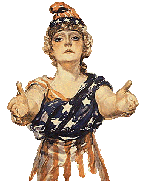Meet MythAmerica Series

Part 1 Part 2 Part 3
American Way of Business
It is a common mythconception among Americans that something has "changed" in America in recent decades-drastically for the worse-in the way businesses treat their workers. Hourly workers are often unable to make enough to support their families, underpaid and overworked and ignored. Big Box stores like WalMart come into communities, take all the business-and employees-away from local mom and pop stores, and then either abruptly decide to quit and leave the community devastated, or stay but pay practically slave labor wages to all their employees. And the way most of these big stores undercut the prices for goods charged by smaller stores is to fill their stores with items produced by sweat shop labor in countries with few restraints on factory working conditions. Oh, how far we have fallen as a society from the golden days of the proud American economy of a century ago, many think. If that's what you think, think again. The articles in this series chronicle a different historical American Business Ethic than you may be familiar with.
Part 1: UnAmerican Activities?
Walmart didn't invent the tactic of offering a centralized shopping experience and a wide variety of goods, able to cut prices because of volume production and distribution, able to take advantage of cheap labor in far-flung places, and all the other factors that make it despised by smaller merchants now. Frankly, Walmart can't hold a tiny candle to the flaming splendiferousness-and soul-less cut-throat business practices-of the department store movement of a century ago.
Part 2: Pinching Pennies 'til They Screamed
It is common these days to regularly read "investigative reports" on news sites on the Web about the miserable salaries and working conditions of hourly workers in America, such as cashiers at WalMart. But such reports long predate the Web, and predate even television and radio journalism. This article highlights a 1910 magazine expose' of how hellish life was for sales clerks in the heyday of the all-encompassing "department store."
Part 3: Plausible Deniability
A horrible fire in a ramshackle sweat-shop garment factory in Bangladesh in 2012, where over 100 workers died and scores more were seriously injured, caused an international uproar. The factory made items sold by a number of US brands such as Walmart "Faded Glory" and Dickies. It is certainly horrible that American corporations don't take a stronger interest in assuring safe working conditions and fair wages for third world workers from whose efforts they profit. But many Americans are unaware that it wasn't all that long ago, in the lifetime of the grandparents of many current Americans, when US corporations didn't even take much interest in the conditions for workers in factories in their own country. It took great tragedies here in the US before anyone "did anything about" such horrible conditions right on American soil. This article examines that 2012 Bangladesh fire, and then provides an historical overview of the infamous New York City "Triangle Shirtwaist Factory Fire" of 1911, where more workers-including young teens-died than in that Bangladesh inferno.





Exploring our past to sort out myth from reality
Share this Page on
Facebook or Twitter

These are the voyages of the TimeShip Anachron.
Our Mission: To boldly explore the past, dispelling
mythinformation and mythconceptions
of American History along the way.
 Visit us on Facebook
Visit us on Facebook







 Visit us on Facebook
Visit us on Facebook